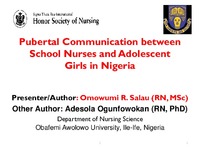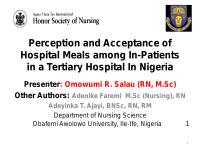Pubertal communication between the school nurses and adolescent girls in Nigeria
View File(s)
- Author(s)
- Details
-
Omowumi Romoke Salau, RN, RM, RPHN; Adesola A. Ogunfowokan, RN, RM, RPHN, FWACN
- Sigma Affiliation
- Non-member
Visitor Statistics
Visits vs Downloads
Visitors - World Map
Top Visiting Countries
| Country | Visits |
|---|
Top Visiting Cities
| City | Visits |
|---|
Visits (last 6 months)
Downloads (last 6 months)
Popular Works for Salau, Omowumi Romoke by View
| Title | Page Views |
|---|
Popular Works for Salau, Omowumi Romoke by Download
| Title | Downloads |
|---|
View Citations
Citations
Session presented on Thursday, July 21, 2016:
Purpose: School nurses play a significant role in communicating reproductive health information to adolescent girls especially during pubertal period which could help make the period less confusing. The role of school nurses in such capacity in Nigeria has received limited attention hence, the need to investigate how school nurses were able to provide information on pubertal changes in a view to improve the knowledge of adolescent girls on pubertal changes and thus promote their sexual and reproductive health by provision of school health services.
Methods: A descriptive sequential mixed method was adopted for the study. A multistage sampling technique was employed to select 420 adolescent girls from five purposively selected private secondary schools in three local government areas of Osun State, Nigeria. All ten (10) school nurses working in the selected private secondary schools were selected for the qualitative aspect of the study. Inclusion criteria include adolescent girls aged 10-18 years schooling in the selected schools with school clinics and school nurses. A self-developed and validated questionnaire and interview guide was used for data collection. Quantitative data was analyzed using percentages, mean, standard deviation, Spearman rho correlation and chi square, while qualitative data was subjected to content and thematic analysis.
Results: There were 10 school nurses and 420 school adolescent girls, with a mean age of 31.4 +/- 6.0 and 13.6 +/- 1.7 years respectively while 88.3% of the school girls observed their first pubertal change below age 9. The result showed that communication on pubertal changes is not regular and frequent as 40.2% and 46.4% of the school adolescent girls were educated about physical body changes and menstruation once in a session by the school nurses respectively, while 16.2% of the school girls were informed about menstruation once in a month by the school nurses. Close to half of the respondents 47.6%, 42.6%, 44.3% never informed about sexual abstinence and contraception, sexually transmitted diseases and teenage pregnancy respectively. Group teaching and classroom teaching were the major methods of communication employed by the school nurses while individual method and demonstration were the least methods used. Verbal discussion was the most used medium of communication, while audio visual aids, phone messages and email least used media. The results further indicated that dsymenorrrhea, body odour, vaginal itching, and concern about weight gain accounted for 65.9%, 84.8%, 81.7% and 74.5% of the adolescent girls' health challenges and reasons for visiting the school clinics respectively while 77.9% of the adolescent girls visited the school clinics for emotional counseling. The results further showed the challenges encountered by the school nurses to include time constraints, topic censorship by school authorities, non-availability of teaching visual aids and non inclusion of pubertal education in the school curriculum. The results also showed that majority of the adolescent girls 80.7% had good knowledge of pubertal changes, 13.8% had fair knowledge while 5.5% had poor knowledge of pubertal changes. Significant association was found between the adolescent girls' knowledge of pubertal changes and Maternal educational level (p-val=0.008), paternal educational level (p-val=0.001) and grade level (p-val=0.00) while no association was found between their knowledge and age of the adolescent girls (p-val=0.385). Frequency of school nurses' communication was found to significantly influence the school adolescent girls' knowledge of pubertal changes (p-val=0.043).
Conclusion: School nurses can play a strategic role in the education of adolescents on issues relating to their reproductive and sexual health. The study concluded efforts should be made to promote school nurses involvement in pubertal education in the schools by the full implementation of the national policy on school health in the country vis a vis provision of standard school clinics well equipped with both the needed medical staff and materials in order to promote the sexual and reproductive health of school adolescents.
Theme: Leading Global Research: Advancing Practice, Advocacy, and Policy
Items submitted to a conference/event were evaluated/peer-reviewed at the time of abstract submission to the event. No other peer-review was provided prior to submission to the Henderson Repository.
| Type | Presentation |
| Acquisition | Proxy-submission |
| Review Type | Abstract Review Only: Reviewed by Event Host |
| Format | Text-based Document |
| Evidence Level | N/A |
| Research Approach | N/A |
| Keywords | Promoting Pubertal Health; School Health Nursing; School Health Nurses |
| Name | 27th international Nursing Research Congress |
| Host | Sigma Theta Tau international |
| Location | Cape Town, South Africa |
| Date | 2016 |
All rights reserved by the author(s) and/or publisher(s) listed in this item record unless relinquished in whole or part by a rights notation or a Creative Commons License present in this item record.
All permission requests should be directed accordingly and not to the Sigma Repository.
All submitting authors or publishers have affirmed that when using material in their work where they do not own copyright, they have obtained permission of the copyright holder prior to submission and the rights holder has been acknowledged as necessary.
Related items
Showing items related by title, author, creator and subjects.
-
Assessment of school connectedness and pregnancy susceptibility among in-school adolescents in a semi-urban town, Nigeria
Salau, Omowumi Romoke; Odetola, TitilayoSchool connectedness is a needed concept to be explored in the issue of adolescent susceptibility to teenage pregnancy. Its understanding is a critical platform for developing effective pregnancy reduction among adolescents. ... -
Experiences of sexual abuse by school adolescent girls in Ile-Ife, Nigeria
Ogunfowokan, Adesola Adenike (2013-10-22)Session presented on: Tuesday, July 23, 2013: Purpose: The Study was designed to assess experiences of sexual harassment, sexual exploitation and rape among school adolescent girls in Nigeria. It was also designed to ... -
Perception and acceptance of hospital meals among inpatients in a tertiary hospital in Nigeria
Salau, Omowumi Romoke; Faremi, Funmilola Adenike; Ajayi, Adeyinka T. (2017-06-19)Purpose: Hospital food and nutrition services play an important role in patient recovery and well-being. It can also influence patients’ satisfaction with their overall hospital experience. Previous studies showed ... -
Relationship between work-related stress, resilience, and job performances of clinical nurses: A preliminary study
Olatubi, Matthew Idowu; Ogunfowokan, Adesola AdenikeThis study is a preliminary one which employed descriptive cross-sectional design. Overall, a significant relationship was observed between resilience level of the nurses and their job performances (p =0.00) but no significant ... -
Preventive management of anemia among caregivers of sickle cell disease patients in a Nigerian hospital
Faremi, Funmilola Adenike; Salau, Omowumi Romoke; Akobi, Victoria FunmilolaAnemia in people suffering from Sickle Cell Disease (SCD) is a major concern of all involved in their management. Understanding the anemia preventive practices among primary caregivers and significant others involved in ...





